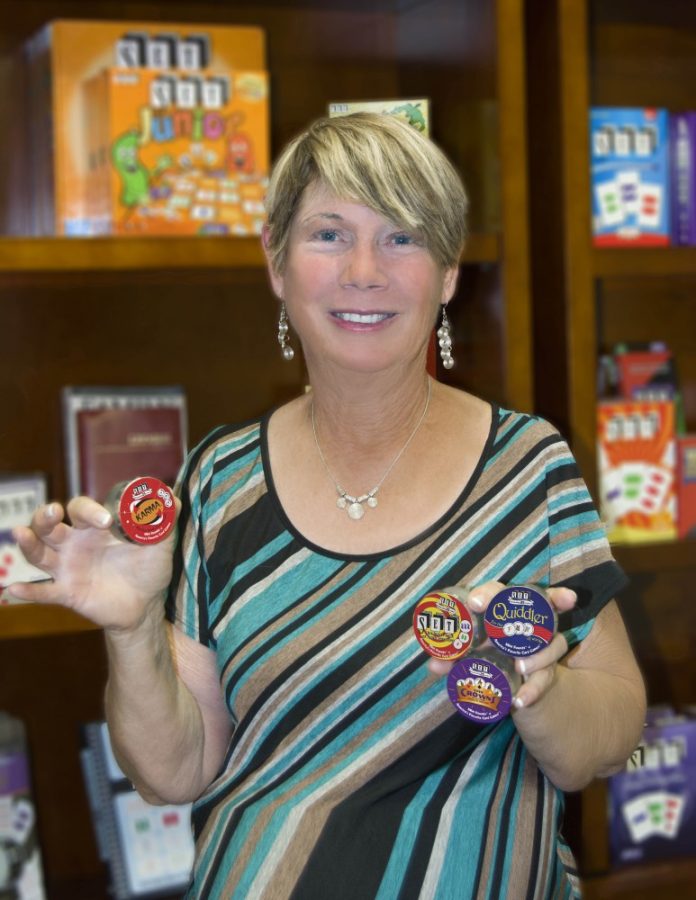This semester, in a conscious effort to recognize women for their contributions to science, the Daily Wildcat will run regular profiles of women who hope to change the world through their passions for knowledge. Some of the women to be featured are only just beginning their careers in research or medicine, while others have already impacted the decisions of aspiring young scientists through teaching and mentorship. We continue our series today with a profile of Marsha Falco, a trained scientist who used her skills to develop board games and enter the world of business.
The card game SET, a recipient of many top game awards, is one of the most popular card games available on the market. The game is played using cards that contain an array of distinct symbols. Players try to collect certain combinations of cards in order to form a “set” and whichever player has collected the most sets at the end of the game is declared the winner.
SET has been a family favorite since its release in 1991, but few players know the fascinating story behind its creation.
Marsha Falco, the creator of SET and the founder of Set Enterprises Inc., is a biologist by training, earning degrees in animal science from Arizona State University and population genetics from Michigan State University. She founded Set Enterprises in nearby Fountain Hills, Arizona.
“I loved animals and raised dogs ever since I was a child, … so continuing my love for animals seemed to come naturally to me,” Falco said of her educational background.
While working in a genetics laboratory at the University of Cambridge studying epilepsy in German shepherds, Falco found herself with a problem: How to effectively catalog vast and often repetitive data. She began using symbols on index cards to represent genetic similarities in the dogs instead of writing out the data in words, according to her online profile. This was before computers were being widely used for cataloging, and Falco’s system was representative of her extensive mathematical training.
“I had a strong mathematical and science background from the very beginning and I still love the challenge of science,” she said.
Falco, an avid game enthusiast, soon recognized the potential for a pattern-recognition game hidden within her collection of data cards, and SET was born. It took almost two decades, from her development of the card catalog system in 1974 to the game’s publication in 1991 to perfect the system, but it was certainly worth the wait.
“When we first started producing SET, we gave ourselves a goal: two years and 5,000 copies of the game,” Falco said. “Needless to say, we sold the 5,000 copies—much more quickly than we had anticipated—and we ended up building the company out and creating other really fun games.”
Falco’s own interest in games—particularly those focused on skill—compelled her to design SET.
“I grew up playing games and I always enjoyed them,” she said. “I especially loved games that involved more skill than luck.”
Falco was also a pioneer in her field as one of the few women in the sciences in the 1970s, in addition to her success in the game industry.
“This was a time where most women were also finding that equality did not mean sameness,” Falco said. “Luckily, I was one of the few—male and female alike—who had the skills for computer programming. Being in the sciences as a woman meant work. It meant becoming a trailblazer on the new frontier of using computers in practical applications and that was exciting for me.”
As Falco has proven, science and game design require similar skills and share some of the same challenges.
“Science has a lot of quirks and an incredibly fun side to it,” she said. “It’s all about being excited to find that ‘Aha!’ moment. Creating games is that ‘aha’ moment every time.”
So what advice does this innovative and successful scientist and game designer have to share with the next generation of gamers?
“Game design is very difficult,” Falco said. “You have to have a passion for what you’re doing, and you’ll also want a reliable day job on the side. It takes time and patience, but the effort is worth it if you really believe in your creation.”
Falco has taken a path in life, which many others would love to follow.
“Science has so much ever expanding potential and should never be boring,” she said. “My advice to students in either career is to always look for that ‘Aha!’ moment and to always ask questions. It’s how you learn and how you grow, no matter what path life takes you on.”
Follow Frances Willberg on Twitter.









